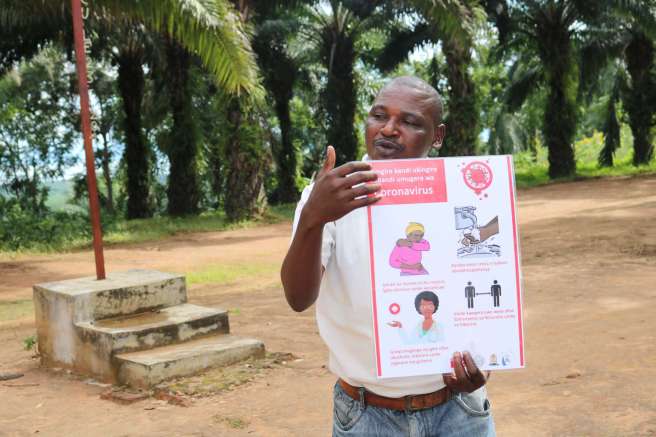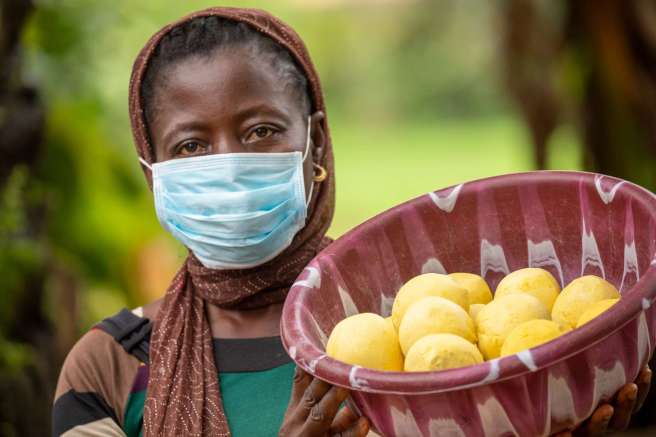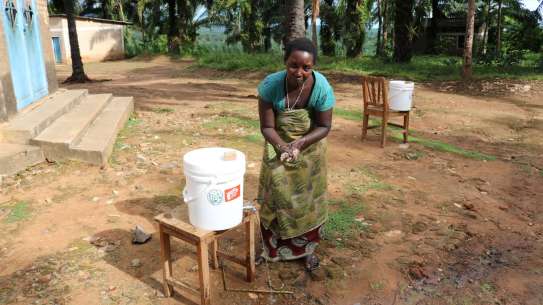While Ireland appears to have ‘flattened the curve’, the global coronavirus emergency is far from over, with some of the world’s poorest countries continuing to see rising levels of cases in recent weeks.
As of mid-June, coronavirus has infected over 8 million people and claimed the lives of nearly half a million across the world.
Physical distancing, testing and tracing are all key measures which governments across the world have deployed to contain the spread of coronavirus and to prevent entire healthcare systems from becoming overwhelmed.
However, for some of the world’s poorest countries, these measures have proven difficult to implement due to a lack of resources, or near impossible to apply where large groups of people live side by side in substandard conditions such as in slums or sprawling refugee camps.
A lack of capacity to test means that for many poor countries, the number of coronavirus cases and deaths are likely to be higher than the confirmed tolls would suggest.
Developing countries are also facing an economic crisis. Lockdown and disruptions to trade have devastated livelihoods across the globe. The World Bank estimates that 100 million people could be pushed into extreme poverty across the world by the end of the year. This means that they are surviving on less than $1,90 a day.
Having adapted existing projects, Christian Aid is responding to coronavirus in 23 countries across the world, with activities frequently focusing on raising awareness of the importance of regular hand washing and physical distancing to prevent the spread of coronavirus as well as distributing soap to around 300,000 people and food to nearly 40,000 people who have lost incomes due to lockdown restrictions.
Let’s take a look at some of the ways in which Christian Aid, with support from Irish Aid, is responding to coronavirus and helping to save lives in four of the most fragile states in the world.
Burundi
Burundi has a population of 11 million people and is one of the most densely populated countries in Africa. Unlike many other countries across the world, physical distancing, a key measure advised by the World Health Organisation (WHO) to help prevent the spread of coronavirus, is not being enforced in Burundi at present.
Burundi is also not imposing a lockdown like most other African countries. While confirmed cases of coronavirus are low, the number of cases have risen by 25% in the third week of June, leaving no doubt that work remains to be done to tackle the virus.
Christian Aid has been responding to coronavirus in two provinces in the south of the country, Rumonge and Makamba. Three of our local partners, RCBIF, CNEB and PEAB, are raising awareness of the importance of physical distancing and regular handwashing to prevent the spread of the virus.
To enable people to wash their hands thoroughly, RCBIF and PEAB are also distributing handwashing kits containing soap and water containers to over 1,300 families, 40 community groups and 200 churches across both provinces while CNEB are distributing handwashing kits containing soap and water containers to 60 schools for use by almost 27,000 children. Christian Aid have also provided loudspeakers to help raise awareness of coronavirus within communities via loudspeaker announcements.
Image credits and information

Democratic Republic of Congo (DRC)
By mid-June, coronavirus cases in the DRC, home to 84 million people, jumped to over 5,100 cases. This is occurring against a backdrop of a new outbreak of Ebola in the country’s northwest, as well as the ongoing impact of the world’s largest measles outbreak which has claimed almost 6,800 lives since 2019.
Christian Aid is responding to coronavirus in Kalehe and Mwenga territories in South Kivu in Eastern Congo. With funding from Irish Aid, our local partner ECC MERU is using community radio to raise awareness of the importance of physical distancing and regular hand washing to prevent the spread of the virus. They are also using loud speaker announcements at community committee meetings in three villages in Kalehe.
In one of these villages, Christian Aid have provided over 1,300 people, including those displaced by fighting and the communities hosting them, with handwashing kits containing buckets with taps, jerry cans for storing water as well as bars of soap to help them be able to wash their hands and reduce the risk of catching the virus.
Across all three villages Christian Aid provided 185 people who are members of agricultural committees with ‘hygiene kits’ containing the above items as well as masks so they can reduce the risk of catching the virus while attending committee meetings.
With support from Irish Aid, Christian Aid have also built three wells in Kalehe to ensure that almost 8,000 people have access to clean water.
South Sudan
With only four ventilators and 24 intensive care beds for its 11.7 million people, the world’s youngest country is arguably one of Africa’s most vulnerable and least equipped countries to be able to deal with coronavirus, especially if a spike was to occur.
In two counties in Northern Bahr el Ghazel state, Christian Aid has so far reached over 11,600 vulnerable people with awareness raising on the importance of physical distancing and regular handwashing to prevent the spread of coronavirus. Twenty local ‘hygiene promoters’, who alert people to the dangers of water-borne and other diseases linked to poor sanitation, have received further training on coronavirus and have been conducting door to door awareness raising sessions about the virus across both counties. These health messages have also been reaching people during distributions of seeds and farming equipment carried out by Christian Aid’s local partner.
Christian Aid have plans in place to distribute nearly 4,000 bars of soap and around 600 handwashing facilities consisting of jerrycans complete with taps in both counties to help ensure people are able to wash their hands thoroughly to help prevent the spread of coronavirus.
Myanmar
In Myanmar, Christian Aid’s local partners in Northern Shan and Rakhine states have distributed soap to over 30,000 people as well as demonstrated thorough handwashing techniques and shared information on considerate coughing and the need for returning family members to self-quarantine for 14 days.
Image credits and information

Christian Aid has plans in place to provide food including rice, pulses, oil and salt to over 2,000 families living in both villages and camps for displaced people.
Some communities have refused to accept returning migrants into their villages, despite their stay in quarantine centres, for fear they would spread coronavirus. This has resulted in some migrants having to remain outside of their villages for longer than anticipated, leaving many at risk, particularly women and girls. Our local partner will be tackling stigma around coronavirus through awareness sessions by distributing printed materials with information on preventing violence against women and girls as well as contact details for support services.
Please donate to the Coronavirus Emergency Appeal today.
The coronavirus responses referenced above are funded by Irish Aid’s Humanitarian Programme Plan (HPP). Irish Aid is the Irish Government’s programme for overseas development.
